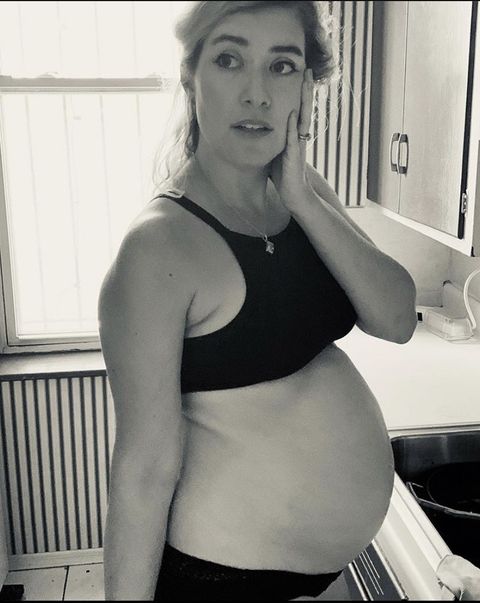Last week, an ad depicting a postpartum mother was banned from airing during the Oscars. It was created by Frida Mom, a company offering products to new moms, with the aim of demystifying postpartum recovery. ABC and the Academy Awards, however, ruled the ad “too graphic” for network TV.
In it, we see a woman (Laura Gilreath) waking up in the middle of the night to her child’s cries. She’s in pain, wincing and struggling to sit up. She slowly makes her way to the bathroom wearing the mesh underwear that hospitals give to new moms. Once on the toilet she contends with a large pad and a squeeze bottle of warm water, two vital supplies during the postpartum period. Throughout the ordeal, her baby continues to cry.
After the ad was banned, it went viral on YouTube and Instagram, with supportive comments rolling in from thousands of moms, including Busy Phillips and Ashley Graham. “The moment I saw that woman trying to get up from the bed I started crying. Postpartum is by far the worst and least talked about part of pregnancy,” one commenter wrote on YouTube, where the ad has more than 3 million views.
When Gilreath (pictured above with her newborn Maggie) was being cast, she had no idea the firestorm that would come. She spoke out to ELLE.com for the first time about the uproar, her own recovery, and what it’s like to be at the center of an important conversation.
The casting for this part is so specific, were you actually postpartum?
No, the casting called for a woman who was five or six months pregnant, depending on your body type, to play the woman, and I was five months pregnant. But the reason they cast a pregnant woman and not a postpartum lady is that there’s no way a postpartum woman could have done a shoot like that. I had to walk down the hallway multiple times, I was probably shooting that scene on the toilet for over four hours. It was challenging just being pregnant and doing that.
At any point during filming, did you think what you were doing might offend people?
Even though I have never seen a person on the toilet in an advertisement before, I didn’t think it was too graphic, it’s real life. Because of filming that ad, I knew [what] I was going to go through after I gave birth. I didn’t even know about the mesh underwear you leave the hospital in until they showed me on set. It totally freaked me out. They were giving me direction to make it realistic, explaining that it would be really hard to even sit up, that it would be hard to walk, that I would be in a lot of pain.
So it helped you with your own postpartum experience?
Absolutely. You think, the labor is the hardest part, and then you’re done, you can go home and everything’s great, you’ll be able to like, go for a run the next day, but that’s not the case. One week after giving birth, I tried to walk to the coffee shop down the street and had to turn around, I couldn’t make it down the block. It was too painful. People aren’t aware of how traumatizing it is to push a baby out of your body. That’s something we don’t talk about.
Were you surprised to find out that the ad had been rejected from running during the Oscars broadcast?
I didn’t know the ad was being submitted to the Oscars, so the first I heard of it was when I saw on Frida Mom’s Instagram that it had been banned. I was disappointed that it didn’t air at the Oscars. I think People don’t want to see the dirtiness of birthing a baby, even though so many people have babies. They want to keep the idea of a woman being very clean and sexy, like how Kate Middleton had a baby and then came out of the hospital and looked perfect. But a woman who just gave birth is not too graphic. It’s nothing to be ashamed of. So many of our stories are the same, but we suffer in silence because we don’t talk about our experiences. It’s been normalized that women are in their bikinis in an ad, but it’s not normalized to see a woman postpartum.
How does it feel to be linked to this viral moment?
It’s indescribable. I love it. Now that I’ve gone through having a child and I’m eleven weeks postpartum, I relate to all of these moms. Society is unaware of how awful it is for women. I’m really glad the commercial is starting a conversation that has never really been had before. I’m hoping that more women will see it, and feel free to throw around “vagina” and “tearing” and “stitches” and “bleeding.” It’s 2020, nothing needs to be hidden like that! This is real life. Let’s talk about it.
This interview has been condensed and edited for length and clarity.

